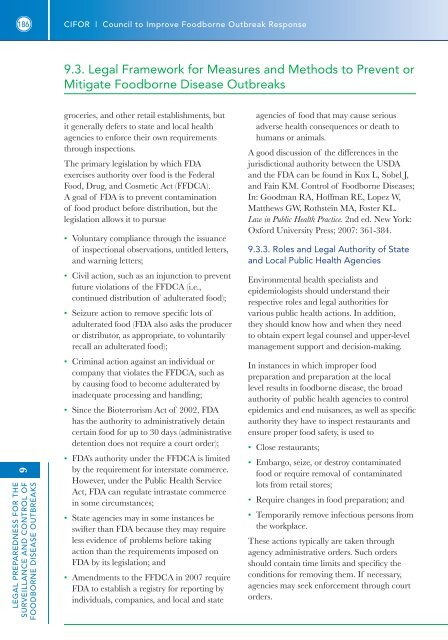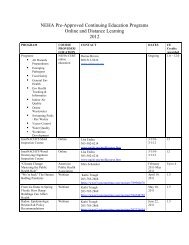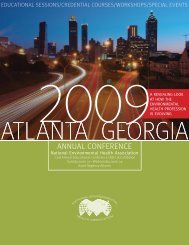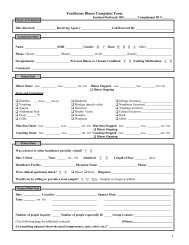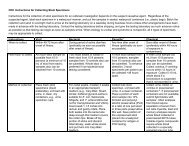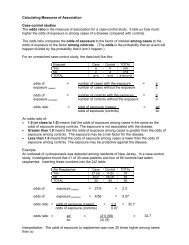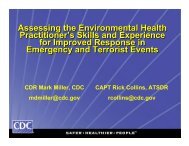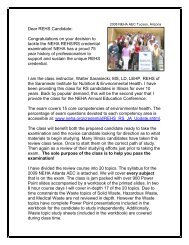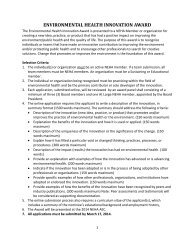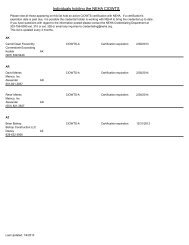Guidelines For Foodborne Disease outbreak Response.pdf - CIFOR
Guidelines For Foodborne Disease outbreak Response.pdf - CIFOR
Guidelines For Foodborne Disease outbreak Response.pdf - CIFOR
You also want an ePaper? Increase the reach of your titles
YUMPU automatically turns print PDFs into web optimized ePapers that Google loves.
186<br />
<strong>CIFOR</strong> | Council to Improve <strong>Foodborne</strong> Outbreak <strong>Response</strong><br />
9.3. Legal Framework for Measures and Methods to Prevent or<br />
Mitigate <strong>Foodborne</strong> <strong>Disease</strong> Outbreaks<br />
9<br />
Legal Preparedness for the<br />
Surveillance and Control of<br />
<strong>Foodborne</strong> <strong>Disease</strong> Outbreaks<br />
groceries, and other retail establishments, but<br />
it generally defers to state and local health<br />
agencies to enforce their own requirements<br />
through inspections.<br />
The primary legislation by which FDA<br />
exercises authority over food is the Federal<br />
Food, Drug, and Cosmetic Act (FFDCA).<br />
A goal of FDA is to prevent contamination<br />
of food product before distribution, but the<br />
legislation allows it to pursue<br />
• Voluntary compliance through the issuance<br />
of inspectional observations, untitled letters,<br />
and warning letters;<br />
• Civil action, such as an injunction to prevent<br />
future violations of the FFDCA (i.e.,<br />
continued distribution of adulterated food);<br />
• Seizure action to remove specific lots of<br />
adulterated food (FDA also asks the producer<br />
or distributor, as appropriate, to voluntarily<br />
recall an adulterated food);<br />
• Criminal action against an individual or<br />
company that violates the FFDCA, such as<br />
by causing food to become adulterated by<br />
inadequate processing and handling;<br />
• Since the Bioterrorism Act of 2002, FDA<br />
has the authority to administratively detain<br />
certain food for up to 30 days (administrative<br />
detention does not require a court order);<br />
• FDA’s authority under the FFDCA is limited<br />
by the requirement for interstate commerce.<br />
However, under the Public Health Service<br />
Act, FDA can regulate intrastate commerce<br />
in some circumstances;<br />
• State agencies may in some instances be<br />
swifter than FDA because they may require<br />
less evidence of problems before taking<br />
action than the requirements imposed on<br />
FDA by its legislation; and<br />
• Amendments to the FFDCA in 2007 require<br />
FDA to establish a registry for reporting by<br />
individuals, companies, and local and state<br />
agencies of food that may cause serious<br />
adverse health consequences or death to<br />
humans or animals.<br />
A good discussion of the differences in the<br />
jurisdictional authority between the USDA<br />
and the FDA can be found in Kux L, Sobel J,<br />
and Fain KM. Control of <strong>Foodborne</strong> <strong>Disease</strong>s;<br />
In: Goodman RA, Hoffman RE, Lopez W,<br />
Matthews GW, Rothstein MA, Foster KL.<br />
Law in Public Health Practice. 2nd ed. New York:<br />
Oxford University Press; 2007: 361-384.<br />
9.3.3. Roles and Legal Authority of State<br />
and Local Public Health Agencies<br />
Environmental health specialists and<br />
epidemiologists should understand their<br />
respective roles and legal authorities for<br />
various public health actions. In addition,<br />
they should know how and when they need<br />
to obtain expert legal counsel and upper-level<br />
management support and decision-making.<br />
In instances in which improper food<br />
preparation and preparation at the local<br />
level results in foodborne disease, the broad<br />
authority of public health agencies to control<br />
epidemics and end nuisances, as well as specific<br />
authority they have to inspect restaurants and<br />
ensure proper food safety, is used to<br />
• Close restaurants;<br />
• Embargo, seize, or destroy contaminated<br />
food or require removal of contaminated<br />
lots from retail stores;<br />
• Require changes in food preparation; and<br />
• Temporarily remove infectious persons from<br />
the workplace.<br />
These actions typically are taken through<br />
agency administrative orders. Such orders<br />
should contain time limits and specificy the<br />
conditions for removing them. If necessary,<br />
agencies may seek enforcement through court<br />
orders.


